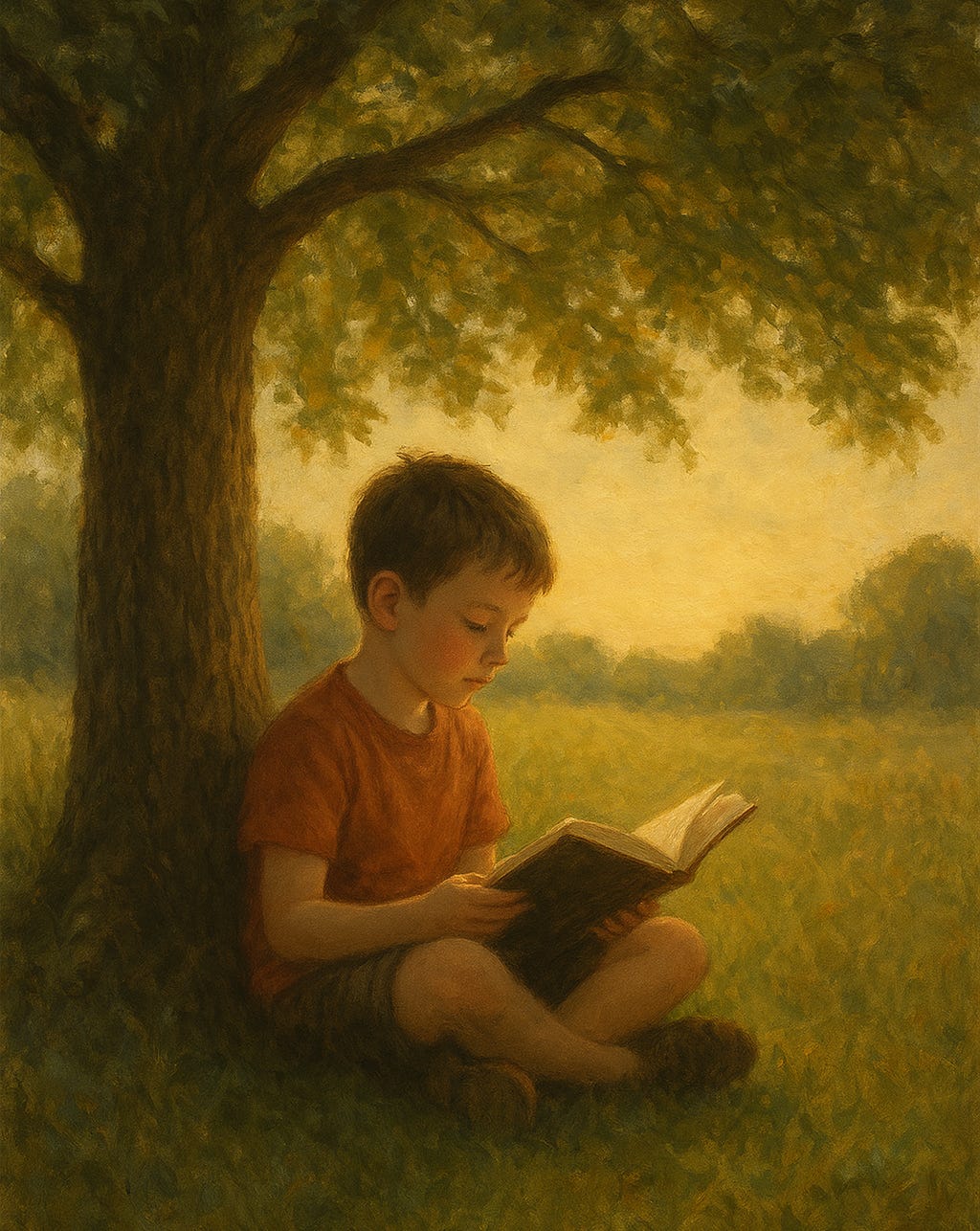On Learning
A few thoughts on learning as a concept and how it changes
As a boy, there were several days when my father would pull me out of the house to help him with larger projects around the house. Whether it was going to scoop some dirt or rock for landscaping, spreading mulch, or even sweeping the garage, there always seemed a need to put my hands to work.
This, of course, didn’t come with a lack of resistance. More often than not, I just wanted to stay inside and enjoy reading, drawing, or playing video games. Apart from outright disrespect, there is no greater frustration to a parent than a complaining child—and I’m sure my father encountered this with me more than once.
Nevertheless, he always made sure to exemplify hard work and usefulness with one’s own hands to us kids. And looking back, I am grateful for his persistence with us, and more importantly, how he embodied those values for us to learn—even when it wasn’t fun.
Learning occurs differently throughout the different stages of our life; we perceive it differently at each stage. Looking back now, I realize I have learned far more from my father’s example than I did in those moments as a boy.
If one were to define “learning” we might call it a “gain” of knowledge or skill. And while it is about gaining, it has just as much to do with what we lose.
In this sense, learning is almost a paradoxical pursuit. You strive to gain the rewards of knowledge, yet in that same process we are refined and called to surrender old assumptions, habits, and ways of thinking. True learning cannot occur unless the pupil is willing to alter what they know, to learn the new.
That alteration can be done several ways through the learning process and takes many forms. A simple example would be how students alter their way of thinking each time they encounter a new teacher. Although their base thinking and identity stays relatively the same, great teachers cause their students to challenge assumptions and forces refinement. This challenge, consistently practiced and enforced, forces students to surrender a part of their old self and build anew. This is primarily done through the learning of new routines, attitudes of the teacher, and how the classroom is managed behaviorally.
Their expertise matters, but their example matters more. It is about how they enact good values around their students and stand strong in them. Kids aren’t the best listeners—but they are excellent imitators.
The process of learning throughout life is the same way. We gain, and refine. We meet obstacles, we adapt. We push the boundaries, and discover the rules.
This idea resounds in the Gospels as well. In the book of Matthew, Jesus says:
“For whoever wants to save their life will lose it, but whoever loses their life for me will find it.”
Matthew 16:25
So even in the ultimate journey of learning, that being Faith, one must lose themselves in order to truly gain.
In Youth
As alluded to with my family story, when we are young we rarely seek knowledge for its own sake. The youthful, fresh, and adventurous spirit that belongs to children creates an urgent desire to explore the world. This usually is subconscious, and it supersedes their desire to explicitly study the world around them.
Yet in His wisdom, God allows those very explorations to become the means of deeper learning.
In those years we wonder what boundaries we can push, and then seek to discover what is most fun or daring to do. All the while, learning more and more about ourselves and what our purpose is.
A boy in middle school doesn’t want to sit down for a 20 minute lecture. But when they are forced to do so, their entire spirit rebels against the order, and then they learn to cope and control that rebellion. They will act out, become extremely talkative, or in some cases socially isolate themselves and shut off the world. These reactions seem bad from the adult perspective at the time, but they actually should be seen as normal and expected responses.
The question is whether the boy is taught how to handle the conflict properly and whether or not the adult will stick to their guns. That is a discovering period for a boy. And the boundaries are exactly what they are testing. Both of themselves and their rule-giver. This also relates to the fact that kids learn more through their routines than they do the actual substance in this period.
When the law is laid down, we examine how we relate and co-exist with that law. We also discover our relation to the lawgiver. Again, a younger child seeks to discover not only the boundaries, but the leniency or relationship possible with that lawgiver.
There is much to be said on learning in these stages of life. In sum, learning in this stage isn’t primarily done through intrinsic desire. It’s done through consistent establishment and following of routines—in which, a young person can gain their identity in relationship to authority and broader society itself.
Learning therefore, is done best at this stage through the coping and understanding of their environment of common rules (explicit), and even more so through broader discovery and play (implicit).
Adulthood
After the initial stages of primary and secondary schooling, we reach the point of adulthood. In common culture within the United States today, that age, although spiritually being delayed more and more, tends to be around 18.
At this point in life, the intrinsic desire to learn starts to develop most. Adults tend to be more grounded in their beliefs and identity, and begin to consider the most effective methods of bettering themselves. This differs from youth because most children do not have the metacognition or broader understanding to see this perspective compared to an adult. This is obviously due to difference in development.
Nevertheless, increased awareness of improvement and desire for knowledge comes at a cost. Our imaginations dim. Our minds become more susceptible to being close-minded, and we fall away from the innocent guise God granted us with earlier.
Although the blessings of knowledge and learning are great, the cost of imagination, wonder, and child-like curiosity are severe. Take chess for example. The young professional players are usually much higher rated and competitive than the older adult players who are higher rated. The fresh perspective and creative ingenuity is easily seen and more prevalent in these younger players. The same is true in life generally.
So what do we seek to establish here? That learning in adulthood (especially early adulthood) is the greatest time to do so, while also being the most costly. It may bring the reader to recall one of the scriptures of King Solomon:
“Then I applied myself to the understanding of wisdom, and also of madness and folly, but I learned that this, too, is a chasing after the wind. For with much wisdom comes much sorrow; the more knowledge, the more grief.”
Ecclesiastes 1:17-18
Being an adult doesn’t equal less imagination or creativity. It does however require more effort to retain those very abilities.
The goal is to balance having greater faculties and desire to learn, with the higher cost of losing your youthful imagination and spirit. In economic terms, it means you try to limit the cost of your tradeoff as much as possible—because there is always a tradeoff in life.
Less insulation from youthful innocence can bring major costs without the discipline and attention toward one’s own mind and its creativity.
With more freedom (lack of innocence and increased autonomy), comes more responsibility (greater choice over actions and learning).
Late Adulthood
Though I cannot claim to be near my later years, there are things that I’ve noticed of my older peers as a younger man.
When it comes to learning, it seems to me that we all reach an age where experience has increased to a point that the thirst to grow dampens. As can be expected, thoughts about the end of life are daunting in and of themselves. We all, in the end, are gravely aware of our own mortality.
Thoughts about the end of life seem to be detrimental to learning in this stage of life.
Now as we mentioned in the outset of this writing, learning takes both the form of “gain” and “loss.”
So this begs the question: does someone of older age still have the openness to learn as in early adulthood, or has their age brought them a certain rigidity of thought?
For many, I’ve seen their years accumulate not only wisdom but also the habits that grow hard to alter. They tend to be “stuck in their ways” as we’ve all heard; looking to prune away the nonsense that they know to be nonsense. Their downside however, is a malaise of rigidity that is unwilling to adapt to a new time they’ve grown into.
While some elderly remain curious and adaptable, it seems a common tendency to rest in what is already known, relying on experience, and resisting the disruption or discomfort that new learning can demand.
The older years are a complex time of life for assessing learning. No one can truly understand the elderly ponderance on life beyond death. However, it may be suggested that during this stage, the urge to stand solid in your worldview and experience can lead to aversion to learning.
A good ending summation here then, would be that late adulthood is marked not by an absence of learning, but by a shift in its form. For some it remains expansive and adapting, while for others consolidating and firm. Wisdom grows from experience; indeed, but so do long, well-trodden habits that harden the mind over time. The challenge is whether one adapts or rests only in what is known.
Takeaways
Learning takes a variety of forms in the different walks of life.
In order for us to gain the most from our learning journey, we must be willing to lose much ourselves. Hopefully, we will focus on shedding what isn’t beneficial to us.
In our youth, our greater imaginative abilities push us to learn most from exploration. That can be either out in the world through play, or our encountering of conflict and rules. Once to an older age, we desire to learn more, but we also risk losing that precious mind of a child.
Further into late adulthood, the risk carries further with the potential of being solidified into one line of thinking. Even if our thinking is right and correct, lack of willingness to adapt can potentially hinder learning.






